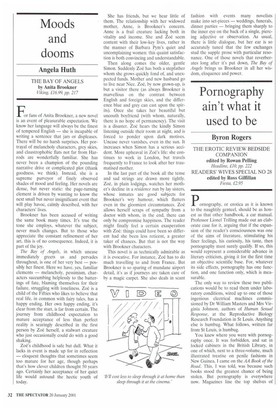Moods and dooms
Angela Huth
THE BAY OF ANGELS by Anita Brookner Viking, i16.99, pp. 217 or fans of Anita Brookner, a new novel is an event of pleasurable expectation. We know her language will always be the finest of tempered English — she is incapable of writing a sentence that jars or displeases. There will be no harsh surprises. Her portrayal of melancholy characters, grey skies, and claustrophobic flats not far from Harrods are wonderfully familiar. She has never been a champion of the pounding narrative drive or complicated plot (thank goodness, we think). Instead, she is a supreme purveyor of finely observed shades of mood and feeling. Her novels are dense, but never static: the page-turning element is driven by wanting to know the next small but never insignificant event that will play havoc, calmly described, with her characters' lives.
Brookner has been accused of writing the same book many times. It's true the tone she employs, whatever the subject, never much changes. But to those who appreciate the constant refinement of her art, this is of no consequence. Indeed, it is part of the joy.
The Bay of Angels, in which unease immediately greets us and pervades throughout, is one of her very best — possibly her finest. Here we have, yes, familiar elements — melancholy, pessimism, characters succumbing helplessly to the batterings of fate, blaming themselves for their failure, struggling with loneliness. Zoe is a child of the Fifties who likes to believe that real life, in common with fairy tales, has a happy ending. Her own happy ending, it's clear from the start, is far from certain. The journey from childhood expectation to mature acceptance of less than perfect reality is searingly described in the first person by Zoe herself, a stalwart creature who just occasionally could do with a good shaking.
Zoe's childhood is safe but dull. What it lacks in event is made up for in reflection — eloquent thoughts that sometimes seem too mature for her age, though perhaps that's how clever children thought 50 years ago. Certainly her acceptance of her quiet life would astound the hectic youth of today. She has friends, but we hear little of them. The relationship with her widowed mother, Anne, is Brookner's concern. Anne is a frail creature lacking both in vitality and income. She and Zoe seem content with their low-key lives, rather in the manner of Barbara Pym's quiet and uncomplaining women: this quaint satisfaction is both convincing and understandable.
Then along comes the older, gentle Simon. Suddenly Zoe has both a stepfather whom she grows quickly fond of, and unexpected funds. Mother and new husband go to live near Nice. Zoe, by now grown-up, is but a visitor there (as always Brookner is marvellous on the contrast between English and foreign skies, and the difference blue and grey can cast upon the spirits). Once she takes her beautiful but uncouth boyfriend (with whom, naturally, there is no hope of permanency). The visit is a disaster. zoe hears the kindly Simon listening outside their room at night, and is forced to ponder upon dark motives. Unease never vanishes, even in the sun. It increases when Simon has a serious accident. More upheaval in Zoe's life: she continues to work in London, but travels frequently to France to look after her traumatised mother.
In the last part of the book all the tense and sad strings are drawn more tightly. Zoe, in plain lodgings, watches her mother's decline in a residence run by lay sisters, whose inmates are good subjects for Brookner's wry humour, which flutters even in the gloomiest circumstances. Zoe allows herself scraps of sympathy from a doctor with whom, in the end, there can only be compromise happiness. The reader might finally feel a certain exasperation with Zoe: things could have been so different had she been less reticent, a greater taker of chances. But that is not the way with Brookner characters.
This novel is as technically admirable as it is evocative. For instance, Zoe has to do much travelling to and from France. But Brookner is so sparing of mundane airport detail, it's as if journeys are taken care of by a magic carpet. She also deals in scant fashion with events many novelists make into set-pieces — weddings, funerals, dinner parties — bringing them sharply to the inner eye on the back of a single, piercing adjective or observation. As usual, there is little dialogue, but her ear is so accurately tuned that the few exchanges stud the supple prose with particular resonance. One of those novels that reverberates long after it's put down, The Bay of Angels brings us Brookner in all her wisdom, eloquence and power.






























































 Previous page
Previous page